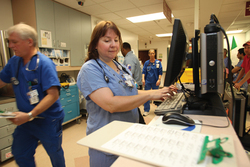TCU's nursing program is training a new brand of health care professional
 |
| Lori Muhr, a registered nurse at Texas Health Harris Methodist Hospital in Fort Worth, is part of TCU's new Clinical Nurse Leader Master’s Degree Program. |
Fort Worth, TX
1/6/2010
By Kathryn Hopper
Lori Muhr, a registered nurse at Texas Health Harris Methodist Hospital in Fort Worth, is part of TCU’s new Clinical Nurse Leader Master’s Degree Program.
Lori Muhr sees it all too often: Patients diagnosed with chronic conditions like heart disease, diabetes and high blood pressure end up back in the emergency room a few weeks after leaving the hospital.
“They may go to a primary physician and a specialist and have a dozen prescriptions, but no one is really coordinating their care and following up on what they need,” says Muhr, a registered nurse at Texas Health Harris Methodist Hospital in Fort Worth.
But Muhr hopes to change that by being one of six inaugural master’s students in the Harris College of Nursing & Health Sciences’ new Clinical Nurse Leader Program. TCU is the first nursing college in the region to offer a path to certification in one of the fastest growing practice areas.
Nurse leaders are described as “advanced generalists” charged with supervising the care of a group of patients, evaluating their risks and outcomes and coordinating their care with other medical professionals and agencies.
The American Association of Colleges of Nursing created the designation in 2004 to address changing trends in health care, including the push to lower health costs and reduce the number of patients who had to be re-admitted to hospitals.
“It’s the first real new role for nurses in 40 years,” said Penny Moore, coordinator of the program. “You have to coordinate care for a group of 12 to 16 patients, be a resource person and make sure their care is given in the most efficient, high quality way.”
The CNL is not an administrative or advanced practice nursing role, but rather one that addresses coordination of care and mentoring fellow medical personnel.
Moore said certified nurse leaders commit to lifelong learning, becoming experts in “evidenced-based practices,” and making it imperative that they’re on top of the most recent research on advances in patient care and practices.
“In the past, it has taken 15 to 17 years from discovery to actual implementation,” Moore said of medical advancements. “The clinical nurse leader’s job is to bring those discoveries to the bedside much quicker.”
Students in the two-year graduate program take their classes online and are offered reduced work schedules and tuition support by their employer — Texas Health Resources, a 14-system hospital based in North Texas.
Joan Clark, vice president for nursing at Texas Health Resources, contacted Paulette Burns, dean of the nursing college, in hopes of starting the program at TCU, said Kathy Baldwin, professor and director of graduate studies.
Graduates are eligible to take the CNL national certification exam developed by the American Nurses Credentialing Center.
Muhr said the program is demanding. In addition to her 32-hour work schedule, she spends 20 hours or more a week studying. But she sees real benefits.
“I’m more of a health care detective,” she says. “I go back and look at what they’re diagnosed with, what meds they’ve been on, what’s worked and what hasn’t. I’ll ask ‘Why has the patient been hospitalized six times in the last six months and what can we do to really help them so they aren’t back here next month?
“Maybe they’re on 12 prescriptions, but only five are really working for them, so we cut out the others and that makes it easier and more likely they’ll actually take them.”
For more information on Harris College, visit www.harriscollege.tcu.edu.
Read more in a Dallas Business Journal article.
Media contact:
Shawn Kornegay
s.kornegay@tcu.edu
817-257-5061










